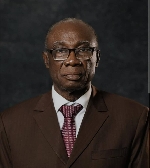Dr Bawumia’s crusade for digitalization is a game -changer for good governance in Ghana
 Dr Bawumia
Dr Bawumia
One of the most important ingredients in the successful adoption and implementation of any innovative policy is what the governance expert Sandford Borins refers to as the presence of Local Heroes.
By Local Heroes, Borins refers to frontline public servants and middle managers who are reinventing government and transforming it into a more efficient and effective system.
After studying various innovative policies and programs that have come to define the American governance system and make it one of the best in the world, Borins concluded that these efforts would not be possible without the presence of Local Heroes.
What is revealing about Borins' research is that most people think all innovation emanates from the private sector. His research, on the other hand, demonstrates that there are innovators (Local Heroes) in the public sector who are helping reshape and make government more competitive and efficient.
As used here, I have this concept in mind but have adapted Local Heroes to mean individuals high up in the echelons of political power, with the right expertise, amount of political power, and will to champion the cause of reform and innovation in government.
Such an individual must have deep levels of political goodwill and be prepared to spend that goodwill and power to support and champion the cause of reform, innovation, and digitalization.
In Ghana, the Vice-President of the Republic, HE Dr. Mahamudu Bawumia, possesses these qualities and can be rightly referred to as a Local Hero of reform, innovation, and digitalization.
It is true that digitalization is not a panacea, nor is it everything to everyone.
However, its promises and advantages of simplifying the governance process, bringing citizens closer to their government, drastically improving public service delivery, and leading to better accountability and transparency in government are undeniable.
That is why governance and public administration scholars have referred to the power and ability of digitalization to lead to a better governance system and seamless service delivery to citizens.
It has had a phenomenal impact on public management by redefining how public services are delivered, speeding up the governance process, and enabling politicians and citizens to interact, engage, and influence each other in the public sphere.
Furthermore, it has the potential to improve the public procurement process, improve accountability and transparency, and help in the fight against corruption in a significant way.
The thing is, digitalization, like globalization, is competitive and delivers different results to different people and governments at different times.
To benefit from it, one needs to make the right investments in hardware, software, and policy and spend the best amount of political power and will to be competitive.
Generally regarded by both his admirers and critics as one of the most influential Vice-Presidents in Ghana’s history, the economist-turned-politician has the ear and full support of the President of the country.
He is also Chairman of the Economic Management Committee of the Government and has the full support and trust of his peers in the Cabinet, the bureaucracy, and even the private sector.
That is why he has over the years cultivated this strong political will and support to crusade for a total transformation of the Ghanaian economy through digitalization. So successful is his cheerleading and campaigning for this cause that he has been affectionately referred to as ‘Dr. Digitalization.’
The results, after almost eight years in power, show that all government policies, programs, and activities have been positively affected by digitalization.
This has resulted in significant investments in technological, financial, economic, and human resources in the sector.
So, what is the scorecard of Dr. Bawumia on Ghana’s digitalization agenda? One of the key ingredients in Ghana’s digitalization process is a strategic state institution known as the National Identification Authority (NIA).
The NIA is vested with the power and authority to issue the Ghana Card.
Housed under the Ministry of the Interior, it was deliberately created to avoid siloization and ensure the concept of horizontality in both its structure and assignments.
Thus, it has a national security aspect handled under the Ministry of the Interior, an economic and financial aspect handled by the Ministry of Finance, a health aspect handled by the Ministry of Health, and the registration of births and deaths under the authority of the Ministry of Local Government (NIA, 2023).
By integrating all these different sectors of the economy into its operation and the Ghana Card it produces, the NIA is in a very strong position to champion the government’s digitalization agenda across all sectors of the country.
It also ensures a one-stop shop for all information and data for individuals and organizations in Ghana. Through digitalization, the Ghana Card is now a master identifier used for identification, travel, financial transactions, property purchases, etc.
Digitalization also improves governance and reduces corruption in the public sector.
This is because digitalization can reduce in-person contact, which is a rich avenue for corruption, and introduce online service delivery. It can also introduce transparency by putting all government services online to be available to all. Transparency then ensures political, legal, and professional accountability.
Dr. Bawumia’s digitalization agenda must be celebrated as a game-changer for good governance in Ghana.
It builds the foundational blocks to move and transition this country to better heights.
Dr. Bawumia’s vision should be celebrated.
His dream to create an efficient and effective public service in Ghana should be cherished by all admirers of good governance.
Dr. Bawumia's digitalization agenda should be recognized as a transformative force for good governance in Ghana.
It lays the groundwork for the country's advancement and progress.
His vision deserves commendation, and his aspiration to establish an efficient and effective public service in Ghana should be valued by all proponents of good governance.
By:Dr Joshua Jebuntie Zaato,
Senior Lecturer,
Department of Political Science
University of Ghana, Legon.
Source: Dr Joshua Jebuntie Zaato,
Trending Features

Russia–Africa:New horizons for old friends
09:23
Justice for sale: When poverty becomes a barrier to the Rule of Law
10:13
In defence of Act 794: Context, competitiveness and the real path to mining value
13:59
KGL's Resilience, impact in 2025 a remarkable benchmark for corporate Ghana
09:06
Is Ghana’s Special Prosecutor truly independent? Legal analysis raises key questions
14:39




